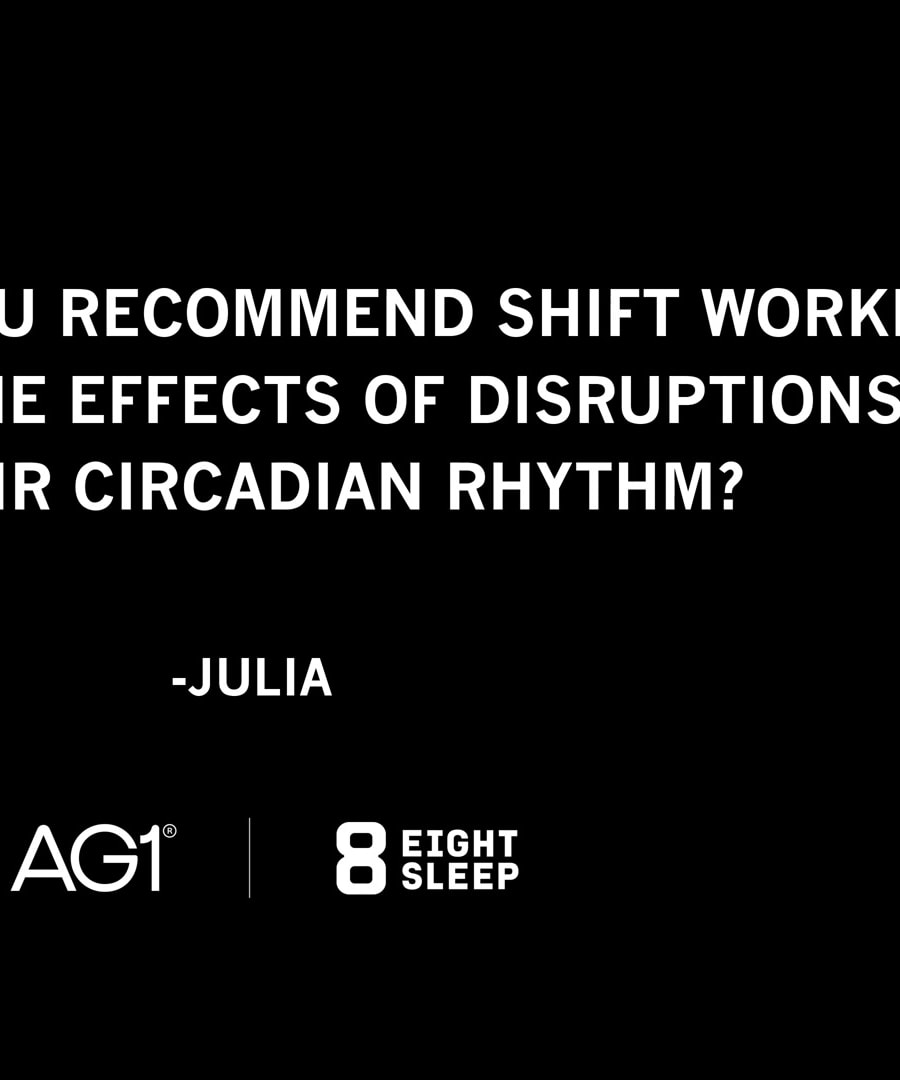Why is morning sunlight important?
Sources:
Morning sunlight is important because it significantly impacts our physiological state, enhancing alertness, mood, and sleep quality. Exposure to morning sunlight increases daytime alertness and also plays a crucial role in regulating your nighttime sleep. Here are the reasons based on the information shared by in the :
-
Regulates Circadian Rhythms: Morning sunlight helps set the body's internal clock, ensuring proper regulation of sleep-wake cycles and various biological processes, like metabolism 1.
-
Boosts Cortisol Production: It triggers a natural increase in cortisol, a hormone that helps promote wakefulness and, in controlled amounts, supports a healthy immune system 2.
-
Improves Sleep Quality: Exposure to bright morning light is linked to better sleep quality as it helps time the release of melatonin, the sleep-inducing hormone, more effectively for the evening 3.
-
Enhances Mood and Mental Health: The interaction of sunlight with specific cells in the eyes triggers pathways in the brain that can improve mood and feelings of well-being 4.
For those unable to get natural sunlight due to geographical or practical reasons, simulated bright light from devices designed to mimic morning light can also be beneficial, though not as effective as natural sunlight 5.
RELATED QUESTIONS-
does it matter when I view the sunlight? also do you have papers on morning sunlight exposure
Sources:
The timing of sunlight exposure is crucial for its effectiveness. Morning sunlight is particularly beneficial because of how it aligns with our natural circadian rhythms. It is most effective when viewed after sunrise. If you wake up before sunrise, you can use bright artificial lights inside until the sun is out, but these aren't as effective as natural morning light. Once the sun is up, it's important to go outside and be exposed to natural light, even on cloudy days 1. If it's very cloudy, staying outside longer can help because duration also plays a critical role in adjusting the circadian system along with the intensity of light 2.
Regarding scientific papers on morning sunlight exposure, there are numerous peer-reviewed studies that show morning light as a potent stimulus for wakefulness throughout the day and improving sleep quality at night. These studies are part of the broader scientific discussion on the physiological impacts of light exposure on human health 1.
RELATED QUESTIONSHow long do I need to view the sunlight? Also does it matter based on my wake time? I wakeup after sunrise, how long after waking, and what happens if I am late
Sources:
For effective sunlight exposure, it's recommended to aim for about 10 minutes within the first hour after you wake up. This sets your circadian clock, helping to optimize wakefulness and improve hormonal balance throughout the day. If you wake up after sunrise, strive to get outside as soon as reasonably possible to maximize these benefits 1.
If you're late getting sunlight exposure after waking up, catch the bright light when you can. Although timing is less critical if you wake up significantly late (e.g., around noon), sunlight can still be beneficial for alertness and mood. It just may not have the same potent effect on resetting your circadian rhythm 1.
RELATED QUESTIONSwhat are the health effects of sitting inside without sunlight all day? I work in an office and from \~9-5 I am in the office. There are no windows where I sit. I go outside for about 15-30 minutes at lunch though.
Sources:
Working indoors without direct sunlight exposure can have several negative health effects, especially if you work in a windowless office. Here are the key points based on what has discussed:
-
Reduced Circadian Rhythm Regulation: Missing sunlight can disrupt your sleep-wake cycle and other physiological rhythms, leading to issues such as poor sleep quality, decreased alertness during daylight, and fluctuations in mood 1.
-
Impact on Vision: Spending prolonged periods indoors, focusing on nearby objects like computer screens, without outdoor exposure, can lead to visual defects and may contribute to the development of myopia (nearsightedness). emphasizes the preventative role of regular outdoor exposure in maintaining healthy eye function 2.
-
Decreased Hormonal Production: Sunlight, specifically UVB light, plays a crucial role in synthesizing various hormones, including vitamin D. Lack of sunlight can lead to deficiencies impacting mood, bone health, and immune function 1.
-
Mental Health Impacts: Lack of natural light affects your mental wellness. Regular exposure to sunlight has been shown to improve mood and cognitive function, making its absence potentially detrimental to mental health 3.
It's great that you manage to go outside for about 15-30 minutes at lunch, but if you can increase this time or find moments to step outside briefly throughout the day, it may help mitigate some of these impacts. Also, considering using full-spectrum light bulbs or daylight simulators could be beneficial if outdoor sunlight is scarce during your work hours 2.
RELATED QUESTIONS-
so I am able to get my morning sunlight before work, but I am in the office without windows from \~9-5 except for the 15-30 minutes at lunch I can go outside if it is nice. But what are direct negative affects, remember I am getting morning sunlight, just not during the day. What can I do to help offset these effects or rid them entirely. There are no windows and obviously some days it will be poor weather and I can't go out during lunch
Sources:
Given your morning sunlight exposure and limited daytime sun during work hours, here are direct effects and strategies to mitigate them, based on the insights shared by :
Direct Negative Effects
- Cognitive and Mood Impact: Inadequate sunlight during the main part of the day could still affect your cognitive function and mood stability. Even if you get sunlight in the morning, missing it during the day could make you feel less alert and possibly impact your mood negatively.
Strategies to Offset Effects
-
Optimize Indoor Lighting: Increase the brightness of your indoor artificial lights during the day to simulate natural light. This can help maintain a healthy circadian rhythm and improve alertness and mood. 1
-
Use Full-Spectrum Light Bulbs: These bulbs can mimic natural sunlight and are beneficial if natural light exposure is limited.
-
Brief Outdoor Breaks: If possible, try to take short breaks to step outside periodically beyond just lunchtime. Even a few minutes can be beneficial.
-
Manage Artificial Light Exposure: Dim your lights as the evening approaches to prepare your body for rest, ensuring better sleep quality. 2
-
Light Therapy Devices: Consider using a light therapy lamp or daylight simulator during the day, particularly during the winter or in very cloudy weather. This can help maintain your energy levels and simulate the benefits of direct sunlight. 3
These strategies can help mitigate some of the negative effects of not receiving sufficient sunlight throughout your workday.
RELATED QUESTIONSwhat about the fact that I am sitting at my desk, thinking all day looking at the computer and not getting any sun, what are negative affects of working in an office all day and what can I do during my workday to offset these
Sources:
Working in an office environment can introduce several challenges, primarily related to reduced physical activity and limited natural environmental exposure. Here are some specific negative effects and strategies to mitigate them, elaborated by :
Negative Effects
- Reduced Physical Activity: Long periods of sitting can lead to health issues such as obesity, cardiovascular problems, and musculoskeletal discomfort.
- Limited Exposure to Nature: Being indoors most of the time, especially away from natural settings, can impact mental and physical health.
Strategies to Offset Negative Effects
-
Incorporate Movement: Integrate short movement or stretching sessions throughout your day. This can help in breaking long sitting periods and promote blood circulation.
-
Enhance Your Environment: Even small amounts of natural elements in the office, like plants, can have a significant positive impact on your mental and physical health. 1
-
Engagement with Water and Sunlight: If possible, finding ways to be near bodies of water during breaks or after work can be highly beneficial. Also, try to expose yourself to natural sunlight whenever possible to maintain circadian rhythms and improve mood and sleep. 2
-
Regular Nature Exposure: Whenever possible, increase your interaction with natural settings, such as parks or gardens. Regular exposure, even if brief, can improve both physical and mental health significantly. 1
-
Adjust Indoor Settings: Utilize tools like negative ionization machines cautiously, as while they offer some benefits, they don't replace the benefits of actual outdoor exposure. 2
These strategies can help counteract some of the negative effects associated with spending long hours in an office. Additionally, maintaining a connection with natural elements can significantly contribute to overall well-being.
RELATED QUESTIONSProvide more health tips for office workers.
Sources:
For office workers, maintaining health and productivity involves a combination of good physical practices and workspace optimization. Here are some additional tips based on the insights from :
-
Incorporating Movement into Routine: Regular low-intensity movements, such as taking phone calls while walking or pacing during work, are excellent ways to keep active. This approach can make significant contributions to daily physical activity levels without requiring extra time in the gym 1.
-
Sit-Stand Workstations: Alternating between sitting and standing during the workday can reduce the risks associated with prolonged sitting, such as cardiovascular issues, neck pain, and a decrease in productivity. Aim to balance your sitting and standing periods to optimize health outcomes and cognitive function 2 3.
-
Screen Position and Alertness: Position your computer screen at or just above eye level to enhance alertness and reduce eye strain. This posture aligns with the physiological mechanisms that control alertness based on eye and head position 4 5.
-
Vision Protection: Regularly practice looking away from your computer to distant objects outside a window or in a broader space. This practice helps relax eye muscles and maintain eye health. For every 30 minutes of screen time, take a moment to look into the distance and relax your focus 6.
-
Light and Circadian Rhythm: For shift workers or those working late, it’s crucial to manage light exposure to sustain a healthy circadian rhythm. Using lighting techniques that limit blue light exposure in the evenings can help in maintaining natural sleep cycles and mood stability 7.
Implementing these practices can significantly improve your health and productivity while working in an office environment.
RELATED QUESTIONS-
Why is morning sunlight important?
- RELATED QUESTIONS
does it matter when I view the sunlight? also do you have papers on morning sunlight exposure
- RELATED QUESTIONS
How long do I need to view the sunlight? Also does it matter based on my wake time? I wakeup after sunrise, how long after waking, and what happens if I am late
- RELATED QUESTIONS
what are the health effects of sitting inside without sunlight all day? I work in an office and from \~9-5 I am in the office. There are no windows where I sit. I go outside for about 15-30 minutes at lunch though.
- RELATED QUESTIONS
so I am able to get my morning sunlight before work, but I am in the office without windows from \~9-5 except for the 15-30 minutes at lunch I can go outside if it is nice. But what are direct negative affects, remember I am getting morning sunlight, just not during the day. What can I do to help offset these effects or rid them entirely. There are no windows and obviously some days it will be poor weather and I can't go out during lunch
- RELATED QUESTIONS
what about the fact that I am sitting at my desk, thinking all day looking at the computer and not getting any sun, what are negative affects of working in an office all day and what can I do during my workday to offset these
- RELATED QUESTIONS
Provide more health tips for office workers.
- RELATED QUESTIONS





















